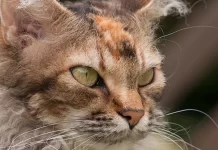Last Updated on November 15, 2023 by Fumipets
11 Herbs That Are Safe for Cats
Exploring herbs that are safe for cats is crucial for feline owners looking to enhance their pets’ well-being naturally. While many herbs offer potential health benefits, it’s essential to ensure that they are safe for feline consumption and don’t pose any health risks. Understanding which herbs are cat-friendly allows owners to incorporate them into the feline diet for added enrichment and potential health perks.
Herbs For Cats
Many of the plants you purchase and produce are safe for your cat to enjoy, making cooking with fresh herbs from your garden an excellent way to save money and enjoy flavorful meals. You know that cats are more inquisitive than other pets since you adore cats. Knowing which plants are risky and which ones are secure is essential since they can cause difficulty by chewing on your crops. The safe and useful herbs will be covered, and the uncomfortable, painful, or worsening plants will also be examined.
The 11 Safe Herbs for Your Cat
Consult your veterinarian to make sure the herbs are suited for your cat’s diet and health before giving it a dish of fresh herbs. Even while certain herbs are not harmful, excessive consumption might nevertheless cause digestive issues or upset stomachs in cats. Keep your herbicides and gardening materials locked up and safe, and watch out for your pet as it experiments with new plants. Herbs are significantly less dangerous to your cat than chemical fertilizers and other poisonous things.
1. Catnip

Catnip is at the top of the list since it is a favorite plant of cats and has psychological advantages for them. Growing catnip in a home garden is easy. It is less costly to buy dry or fresh from the pet store or garden center than other dried plants. Cats that inhale catnip may feel energetic and have endless energy. Although the effect only lasts for up to 12 minutes, cats may use it often without harm. Catnip has a distinct impact when it is consumed by cats. It soothes them, and some of them turn over and go asleep as a result. Before giving your pet a bath or taking them to the veterinarian, you may calm their anxiousness using catnip products.
2. Valerian

Although valerian is a common ingredient in herbal supplements for people, the root has the majority of the medical benefits. Cats that are not influenced by catnip may respond to valerian more favorably than they do to catnip. The herb may be grown, but you must wait until the plant has a strong root system before removing it. If you give your cat a bit of the root to smell, the cat can begin to turn over and purr. Like catnip, some cats may not respond to the plant at all.
3. Cat Thyme

When cats rub against cat thyme plants, they may briefly feel happy and start purring or drooling. You could be astonished by the strong perfume, whether you buy cat thyme or cultivate it yourself. Although cats like the fragrance, cat owners usually keep it outside to minimize the stench from permeating the house. Although it produces a sedative rather than a euphoric impact, cat thyme is likewise safe for cats to consume.
4. Witch Hazel
Witch hazel may help heal acne and small sores from flea bites, but your cat shouldn’t ingest it. Witch hazel is not recommended by veterinarians for serious scratches or punctures.
5. Echinacea

Echinacea may be given to your cat as a blooming plant or a dietary supplement without any problems. The medical value of the plant has not been shown, despite the fact that some cat and dog owners give their animals echinacea to strengthen their immune systems.
6. Dandelion Root
Vitamins A, B, and D are among the many nutrients that adorn dandelions. Cats can eat them without harm, but watch out that they don’t eat too much. Dandelions are a healthy food, but consuming too much plant matter might make you sick and make you have diarrhea.
7. Basil

The fragrant herb, basil, is OK for your cat to eat and is a favorite of home cooks. The majority of cats will simply nibble on basil leaves, so they won’t likely harm the plant or sabotage your crop. Although they tend to prefer fresh leaves, cats may consume dried basil as well.
8. Cilantro
Although your cat may be surprised by the aftertaste, cilantro is harmless for animals. Your cat won’t get sick from coriander seeds, which come from the same plant. Cilantro sprouts from seeds rapidly but bolts quickly in hot weather, so you may only have three to four weeks to use the herb before it goes to seed.
9. Rosemary

Although most pets don’t like rosemary, both cats and dogs may safely consume it. Even though taking too much of the herb might result in gastrointestinal issues, the majority of pets will either ignore it or just take a little bite.
10. Dill
Both fresh and dried dill are healthy for your cat, however the majority of felines dislike the plant. Although some publications claim that dill might help your cat’s digestion, we advise seeing a veterinarian before taking dill as a health supplement. The ASPCA lists dill as a non-toxic herb on their list of poisonous and non-toxic plants, but they haven’t studied or verified its medical advantages.
11. Thyme
Culinary thyme, which should not be confused with cat thyme, is a less pungent herb that you may plant or keep in your house without upsetting your visitors. Although it’s acceptable for cats to consume, most will shun it in favor of something nicer, like catnip, much as they do with dill and rosemary.
Which Herbs to Avoid
Although it’s reassuring to know that many culinary herbs are acceptable to use around pets, you shouldn’t add arbitrary non-toxic plants to your cat’s food without your veterinarian’s consent. Any spice used in excess amounts might make you feel uncomfortable, and some cats may respond negatively to a non-toxic plant due to an allergy. We advise staying away from these plants if your cat spends time outside close to your garden:
Oregano
Marjoram
Chives, onions, garlic, scallions
Tarragon
Lemongrass
Mint
Spring Parsley
Bay Leaf
Chamomile
Cannabis
Mace
Lemon verbena
Dried versions of the aforementioned herbs are acceptable to use in your kitchen as long as you store them in a cupboard or drawer. Animals who swallow the fresh leaves, stems, blossoms, or roots of poisonous plants have the strongest effects.
What to Do If Your Cat Ingests Toxic Herbs
The first thing you should do is contact your veterinarian if your cat reacts poorly to a hazardous plant. If your veterinarian is unable to change their schedule to accommodate an emergency visit, you may still transport your pet to an emergency animal hospital. Making contact with the ASPCA is a necessary next step. The number to reach their poison control hotline is (888) 426-4435. The helpline may provide you with useful information on the symptoms and treatment of your pet.
If your veterinarian has a sample of the poisonous plant, pinpointing the cause of your pet’s sickness will be considerably simpler. For your veterinarian, take a bit of the plant and place it in a sealed plastic bag. When the plant was swallowed, how long it took for symptoms to manifest, and how much material the cat ingested are just a few of the questions your veterinarian will ask concerning the cat’s symptoms.
Conclusion
Many herb species are safe for your furry buddy to enjoy, which is fortunate since some felines will gladly munch on your herbs and plants. Despite the ASPCA’s helpful list of non-toxic and hazardous plants, you shouldn’t give a new plant to your cat unless you’ve first spoken to a veterinarian about its safety.
Your pet may be more susceptible to the negative effects of even a harmless herb if they have an allergy or other health issue. There are an astonishing amount of plants that might harm your cat, but with some study and assistance from this article, you can keep your cat healthy and continue to enjoy utilizing fresh ingredients.
FAQs About Safe Herbs for Cats:
1. Why Consider Herbs for Cats?
Herbs can provide various health benefits for cats, including digestive support, stress relief, and potential insect repellent properties. Integrating safe herbs into a cat’s environment or diet can contribute to their overall well-being.
2. What Are Some Common Herbs Safe for Cats?
Catnip is a well-known herb that many cats enjoy, eliciting playful behaviors. Other safe herbs include parsley, mint, dill, and basil. These herbs not only add flavor but also offer potential health advantages.
3. How Should Herbs Be Introduced to Cats?
Introduce herbs gradually and in moderation. Cats may have individual preferences, so observing their reactions is crucial. Fresh herbs can be added to their food, incorporated into toys, or even grown in indoor gardens for them to explore.
4. Are All Herbs Safe for Cats?
Not all herbs are safe for cats. Some, like certain varieties of mint, can be toxic. Before introducing any new herb, it’s crucial to research and consult with a veterinarian to ensure it poses no harm to feline friends.
5. What Signs Indicate That a Cat Might Not Tolerate a Specific Herb?
Watch for signs of discomfort or adverse reactions, such as vomiting, diarrhea, or lethargy. If a cat exhibits any unusual behavior after herb exposure, it’s essential to discontinue use and seek veterinary advice.


















